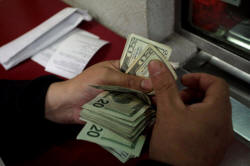|
Dollar heads for best
week in a year, Mexican peso sinks
 Send a link to a friend
Send a link to a friend
 [November 11, 2016]
By Patrick Graham [November 11, 2016]
By Patrick Graham
LONDON
(Reuters) - The dollar was set for its best week in a year on Friday,
extending gains against the yuan and Mexican peso on concerns emerging
markets could suffer most if President-elect Donald Trump turns his
protectionist rhetoric into actions.
Traditional safe havens for investors' money, the yen and the Swiss
franc, recovered some of this week's losses against the greenback,
however, as markets worried about the global consequences of such a
policy shift and of higher U.S. inflation.
Expectations of rising U.S. price pressures if Trump delivers on
promises to boost public spending and put barriers on cheap imports have
driven Treasury yields higher and boosted the dollar since his victory
on Tuesday.
The gains have come almost across the board, with the exception of a
recovering British pound and, in morning trade in Europe, the dollar was
another 0.1 percent higher against the basket of currencies that
measures its broader strength.
There are doubts whether the momentum will continue into next week, and
gains were focused on the two currencies that would be expected to
suffer most from U.S. trade tariffs, protectionism and immigration
controls.

China fixed the yuan another 0.2 percent lower at 6.8120 per dollar and
less-tightly controlled offshore rates reached as high as 6.85, pointing
to expectations of more losses. The peso sank 3 percent to a record low
of 21.395 per dollar.
"Emerging markets to the sword is the chatter," said Richard Benson,
co-head of portfolio investment with currency managers Millennium Global
in London.
"The question is whether the bond rout that we've seen lasts next week.
It is pretty hard for U.S. stocks to keep rising when emerging is
getting whacked, or for the dollar to perform against the yen if risk
assets come under proper pressure."
BULLISH GOLDMAN
The dollar dipped 0.4 percent from highs of close to 107 yen hit on
Thursday. It was marginally stronger on the day at 1.0879 per euro, a
third of a cent off the previous session's 3-1/2 month high.
The greenback, however, was still set to end the week with a more than 3
percent rise against its Japanese peer. It has gained almost double that
from lows hit on U.S. election night before it became clear Trump was
heading for victory.

[to top of second column] |

An employee counts U.S. dollar banknotes at a foreign exchange house
in Monterrey, Mexico, November 9, 2016. REUTERS/Daniel Becerril

Analysts from Goldman Sachs, forced to trim one of the market's
best-known bullish dollar calls earlier this year, said in a note
overnight they expected the greenback to add to its gains.
"Many (are) asking if dollar strength in recent days can extend," they
said. "We think so and see the election as something of a 'reset'."
Goldman are among those who have called for a rise to parity with the
euro. The note gave no details of current forecasts.
The fast pace of the dollar's appreciation against the yen prompted a
response from Japan's Finance Minister Taro Aso, usually known to make
statements when the currency pair moves in the opposite direction.
"It is exceptional for the yen to move 5 yen (against the dollar) in two
days," he told reporters, stressing the importance of market stability.
The New Zealand dollar remained on the back foot after the country's
central bank cut interest rates on Wednesday. The kiwi slipped 0.2
percent to $0.7198, poised to lose nearly 2 percent this week.
The Australian dollar, sensitive to swings in risk appetite, was down
0.2 percent at $0.7598 <AUD=D4> and on track for a 1 percent weekly
drop.
(Editing by Toby Chopra and by John Stonestreet)
[© 2016 Thomson Reuters. All rights
reserved.] Copyright 2016 Reuters. All rights reserved. This material may not be published,
broadcast, rewritten or redistributed.
 |